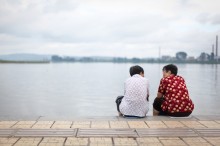The Urban Climate Resilience in Southeast Asia (UCRSAP) is a new $2.5 million research project made possible by an International Partnerships for Sustainable Societies (IPaSS) grant. The partnership, hosted at the Asian Institute at the Munk School of Global Affairs, includes 19 researchers and 12 partners from five countries, including from the University of Toronto Professor Matthew Hoffman (Political Science) and Professor Dylan Jones (Physics).
Asian Institute affiliated Professor Amrita Daniere from the Department of Geography and Planning at the University of Toronto is co-director of the five-year partnership, alongside Dr. Pakamas Thinphanga, a research scientist at the Thailand Environmental Institute in Bangkok.
The project establishes a new network of scholars and researchers to support public forums to mitigate the vulnerability of urban communities to global environmental changes in the region in focus: Cambodia, Myanmar, Thailand, and Vietnam. These countries were selected due to the rapid urbanization and the severe effects of climate change they are experiencing, and are anticipating to continue to suffer. The project’s collaboration features researchers and NGO and governmental partners from all four countries, as well as university partners and researchers in Canada.
“Individual and community vulnerabilities in the region are linked to global environmental change and to the rapid pace of the urbanization and economic integration of the region”, says Daniere. “Through the project, we want to provide vulnerable peoples in transitional states with the space to learn about and share in decisions about protecting themselves from the economic, social, and physical impacts of climate change”.
UCRSAP engages universities, NGOs, local organizations, and local governments to engage in a multidisciplinary partnership, combining the science of interpreting climate change’s uncertainties, risk, and impacts with social science analysis.
Joining the University of Toronto as the project’s initiating partners are York University, the Thailand Environmental Institute Foundation, a non-government think tank focusing on scientific and policy issues in Southeast Asian, the Institute for Social and Environmental Transition, an international NGO with extensive experience in knowledge sharing and building urban climate change resilience.
The IPaSS grant is funded by the International Development Research Council and the Social Sciences and Humanities Research Council of Canada. The IPaSS initiative supports international partnerships that produce high-quality research to inform academic, public, and policy debates in ways that can help create just, inclusive, and sustainable social and economic development. The UCRSAP grant was one of only four IPaSS awards made in 2014.
